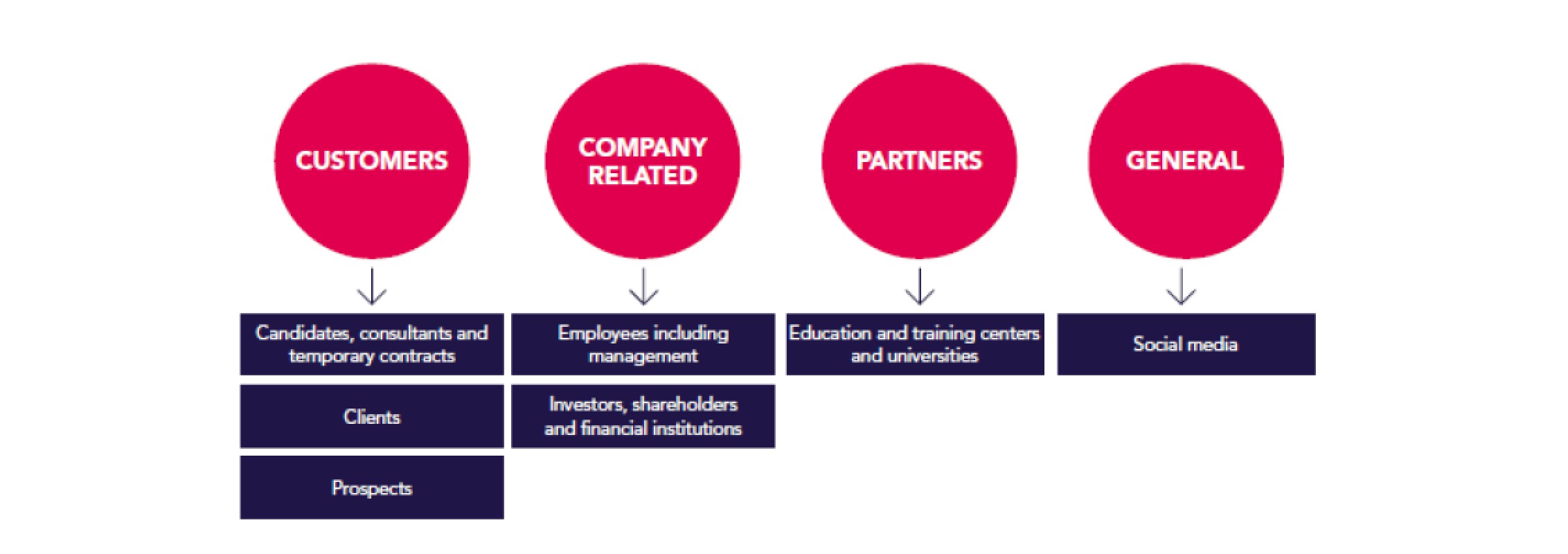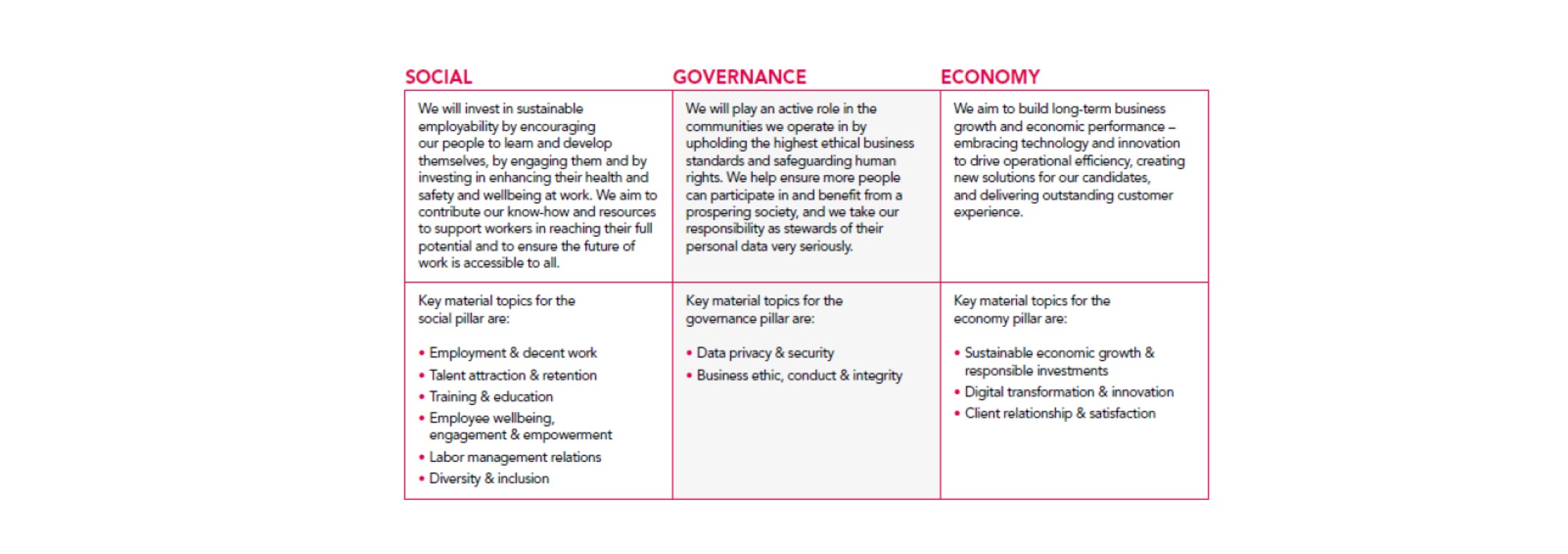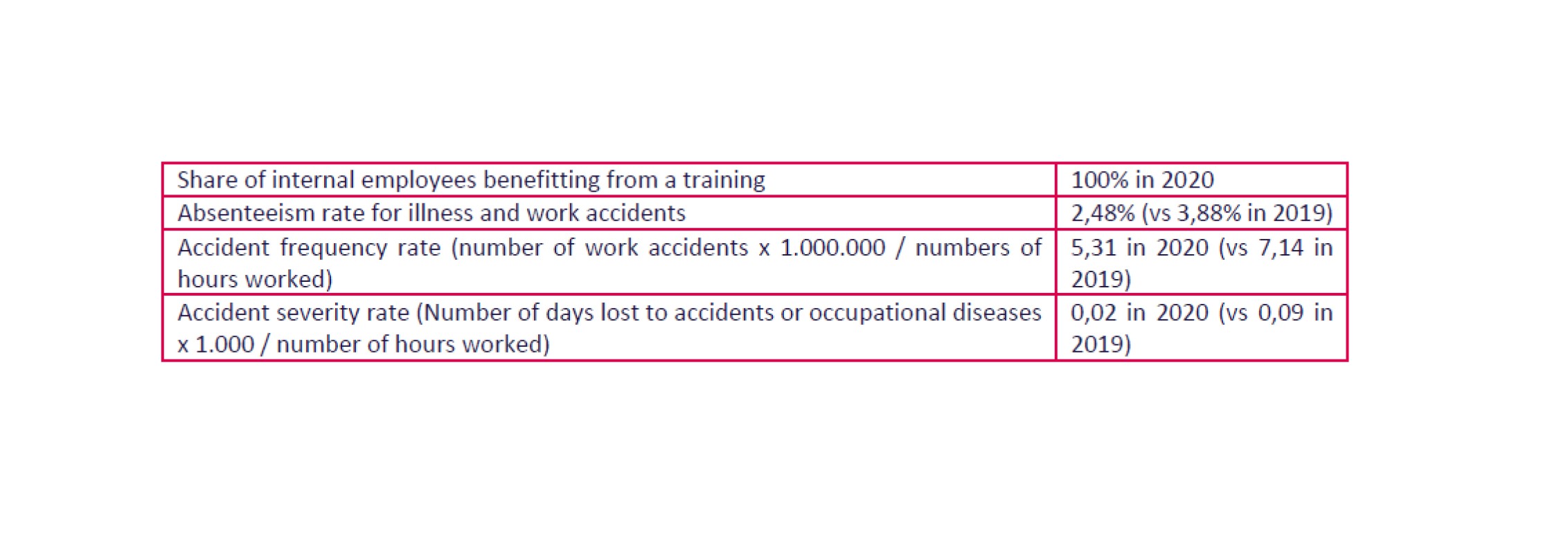ESG Charter
Creating long-term sustainable value
At House of HR we know that the sustainable profitable growth of our company depends on the economic, environmental and social sustainability of the communities we live and work in. That’s why we put sustainability at the heart of our organization and embed it into our business and day-to-day activities. It’s at the core of how we create long-term sustainable value.
Focusing on environmental, social and governance (ESG) issues
Along 2021, House of HR is setting up an environmental, social and governance (ESG) process to create a House of HR sustainability strategy and governance with the support of an external expert. This will allow to track, record and monitor our most material ESG processes. An ESG Committee has been established that exists of both shareholders and management. It will reside 3 times per year. The objective of this committee is to review and monitor the sustainability strategy, performance and reporting.
As part of the development of our sustainability strategy, we have identified House of HR’s key stakeholders:

Going forward, we will roll out a structured process for regularly engaging and consulting with our key stakeholders, so we can stay informed and focused on what really impacts them and the decisions they take.
Three pillars of our sustainability strategy

Social
We are active as HR solutions provider, providing work to + 46.000 different people for our clients and maintaining an internal workforce of + 3.300 internal employees, Happy Rebels we call them.
House of HR has more than 400 managers that either hold shares or share options in the equity of the holding company, House of HR NV. This is linked to one of the strategic pillars of House of HR: to align, motivate and retain our teams with the interests of the company and the shareholders.
There are certain local retention initiatives that differ from company to company following our decentralized structure. Recently, for example, Accent has been awarded as “Best Place To Work” in Belgium amongst the group of large companies.
Furthermore, we consider training, health and well-being to be key in order to attract and retain talent. All internal employees therefore benefit from the necessary trainings in order to grow and cultivate their talents. The below table gives a short overview of certain KPI’s monitored by the risk and internal audit department:

Governance
House of HR has a unitary governance structure at group level. There is a board of directors consisting today of 10 members that are listed below:
Non-operational shareholder representatives:
- Eric Aveillan, Chairman of the Board
- Aurélien Dorkel
- Conny Vandendriessche (representing Pro-Fund BV)
- Grégoire de Mazancourt (representing Naxicap Partners SA)
- Valentin Eischen (representing Banque Populaire Développement SA)
- Agathe Baujard (representing Naxicap Rendement 2022 SAS)
- Paul Thiers (representing Pentacon BV)
Independent board members:
- Astrid Heiremans (representing FinFactory BV)
- Philippe Marcel
Operational board members (managers):
- Rika Coppens, CEO of House of HR
Advisors to the board (these are not board members):
- Daniel Masata
- Wim Folens
Four out of the ten board members are women. Furthermore, the group also has an audit committee consisting of 3 board members with Astrid Heiremans being the chairman of the audit committee. There is also a remuneration committee including 3 board members, with Paul Thiers being the chairman.
UN Sustainable development goals (SDGs)
We have integrated the UN Sustainable Development Goals (SDGs) into our sustainability strategy linking the five SDGs we can have the biggest impact on to our three strategic pillars:
Environment
Our environmental topic is relatively limited given what we do at House of HR. But environmental issues are clearly a top priority for society as a whole, so we keep working to reduce our carbon footprint and energy use. The environmental impact we have is linked to our branch network and our car fleet.
In this respect, we have some initiatives ongoing, such as introduction and use of electric/hybrid vehicles, bicycle lease, environmentally efficient drink and beverage facilities, solar panels on top of the headquarters in Roeselare, etc.
Looking ahead
We aim to continue implementing and strengthening our sustainability strategy and reporting. To this end, we are undertaking a comprehensive analysis to identify the gaps between the Group’s current reporting and the GRI Standards, as well as the Non-Financial Reporting Directive. We will also develop a management approach for the material topics most critical to us. It will include existing initiatives and indicators linked to the topics, and Key Performance Indicators (KPI’s) to measure the Group’s performance against these material topics.
In addition, we are developing an ESG roadmap for the way forward, taking into account evolving regulations as well as good corporate governance. This will entail looking into the purpose of the approach, developing policies, setting up goals and targets, allocating resources and responsibilities and working out specific actions. A clear and thorough governance structure, including a sustainability committee, will be set up to streamline our decision making on sustainability.
As part of our ongoing commitment, we want to promote the most impactful existing local internal initiatives in our different business units and launch new initiatives to further improve the way we work in the interests of all our stakeholders.
General
The ESG committee consists of 4 members including two board members, Conny Vandendriessche and Rika Coppens. The two other members are Anouk Lagae, CEO of Accent and Edwin Van Den Elst, CEO of Redmore acting as chairman of the ESG committee.
Abdel Bencheikh, the group Head of Risk & Internal Audit is appointed as secretary of the committee and he has the responsibility to prepare to content and manage group ESG project.
The ESG committee will reside at least 3 time per year.
